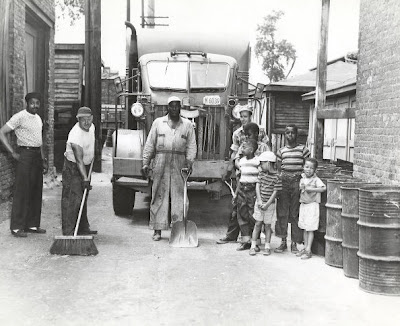View Chicago Urban League Records in a larger map
Save America’s Treasures sites.
 |
| Children on the staircase of the Chicago Urban League headquarters, 4500 South Michigan Avenue (at Grand Boulevard). Photo 74, Chicago Urban League Records, University of Illinois at Chicago Library. |
Richard J. Daley Library
Special Collections and University Archives Department
801 South Morgan Street
Website: Chicago Urban League Records
The Treasure: The
vast files of the Chicago Urban League, serving African Americans in Chicago since 1916, depict
a city on the forefront of powerful social and cultural movements.
Accessibility: The library is open daily, but you can access a great deal of information and images without even
leaving your computer. The
finding aid for the full Chicago Urban League collection is here. Go to the Chicago Urban League Photo page and select Browse Collection on the left to view 255
digitized images from the collection. And there’s a fascinating online exhibit, “Fight School Segregation,”
that showcases documents from the records of the Chicago Urban League.
Background: Background: The
demographics of Chicago
changed fast in the early years of the 20th century. In a movement
often called the Great Migration, African Americans traveled from the South to Chicago in search of
expanded economic opportunities and a better life. The Chicago Urban League
formed in 1916, just as this migration began in earnest. Word quickly spread
through the South that Chicago ’s
industries were hiring to meet new World War I demands for manufactured
goods. The black population of Chicago
rapidly expanded, establishing a new culture within the city that reflected many southern and
rural traditions. The Chicago Urban League worked with organizations like
Travelers’ Aid societies to welcome the new arrivals and offer advice and
resources. From November 1917 to October 1918, nearly 21,000 people came
to the Chicago Urban League’s Bureau of Advice and Information, most of them
looking for help with housing and jobs.
 |
| Black Power movement at the Chicago Freedom Movement Rally, Soldier Field (Freedom Sunday), July 10, 1966. Photo 54, Chicago Urban League Records, University of Illinois at Chicago Library. |
Preserved through a 2005 Save
America’s Treasures grant, the records of the Chicago Urban League tell the
story of the institution from its founding to the very recent past. The records
reflect a volatile city and society in constant transformation. From the early days, the Chicago Urban League worked closed with the University of Chicago ’s
School of Sociology
It was a turbulent century and Chicago was frequently at the center of things.
The Chicago Urban League records cover the brutal five days of race riots in
July 1919, the toll of the depression upon the city, the emergence of the civil
rights movement in the 1950s, and the ongoing struggles for economic
empowerment.
Under the care of the Richard J. Daley Library at the University of Illinois
at Chicago , the
collection includes correspondence, research papers, photographs, artifacts,
and news clippings, originally brought to the library in about 400
cartons. All of the history is valuable, but the black and white
photographs are particularly inspiring. Browse through the 255 digital images
on the library’s website to get a feel for black Chicago in the mid-20th century, as
community members fought for full equality, forged new political connections,
and endeavored to make a better life in the city.
 |
| Martin Luther King, Jr. speaks from a car. Photo 168, Chicago Urban League Records, University of Illinois at Chicago Library. |
 |
| Alley clean up. Photo 14, Chicago Urban League Records, University of Illinois at Chicago Library. |
Other Recommended
Sites: Chicago
is home to the DuSable Museum of African American History, the first and oldest
museum in the country dedicated to the study and preservation of African American history,
culture, and art.
 |
| To Be Equal by Whitney M. Young, published in 1964. Photo 225, Chicago Urban League Records, University of Illinois at Chicago Library. |
Tour America's History Itinerary
Tuesday’s destination: Columbus Park
© 2013 Lee Price


No comments:
Post a Comment